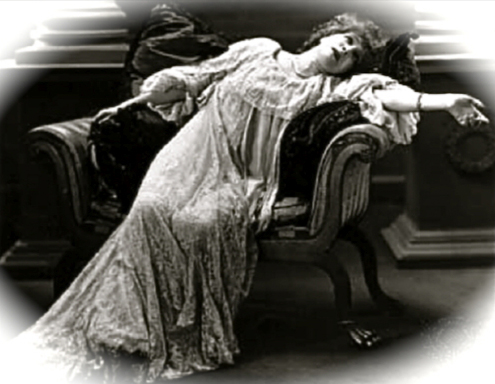Originally posted in 2013, and then updated in 2018 when it came back into the news, Glossophilia is happy to republish one of its most popular posts.
2018 update: The word “cum” is back in the news today, with a censored cake that went viral.
* * Warning: contains strong language * *
Original post in 2013: I was watching Masters of Sex the other night on Showtime, and it struck me that Masters and Johnson were using the word come a lot. And they weren’t meaning the opposite of go. (It didn’t escape my notice that they also seemed to be coming a lot — but that’s another story…) I know these ground-breaking sex researchers of the 1950s and ’60s were famously ahead of their time, but not in their word choices — and their use of this particular piece of sexual terminology sounded weirdly anachronistic to me. I really thought that this word “come” was a more modern invention…
I was wrong.
The Online Etymology Dictionary confirms that this literally orgasmic meaning of the common verb “to come” dates back to the 17th century. “This ‘experience sexual orgasm’ slang meaning of come (perhaps originally come off) is attested from 1650, in “Walking In A Meadowe Greene,” in a folio of “loose songs” collected by Bishop Percy.
They lay soe close together, they made me much to wonder;
I knew not which was wether, until I saw her under.
Then off he came, and blusht for shame soe soon that he had endit;
Yet still she lies, and to him cryes, “one more and none can mend it.”
The same online dictionary also clarifies that as a noun meaning “semen or other product of orgasm”, the word come is on record only from the 1920s — i.e. a few centuries after it began life as a raunchy verb.
So we’ve established that come as a sexual slang word is centuries-old. But what takes up an awful lot of space, time and energy both on and off line is a continuing disagreement about the difference in usage between this word and its younger, more trim variant — cum. Some maintain that the less comely spelling has completely supplanted the original word in a sexual context. Then there are nit-pickers who argue that the choice between the homophones is determined by the word’s grammatical status in a sentence, with come being a verb (“to climax or to reach orgasm”), and cum the — er — resulting noun (“semen” or “ejaculate”). But that’s all tosh, according to others. “Come = erotica; cum = badly-written porn”: so say a lot of armchair linguists on the boards, and this theory does seem to be borne out by the words’ respective success and failure in achieving dictionary status. The OED lists come, defining it as a slang verb dating back to the early 17th century and as a slang noun dating back to the mid-20th century. But cum is apparently too vulgar to warrant an entry in either the OED or the Oxford American Dictionary. I haven’t found it listed (in its slang sense) in any other dictionary, but I must admit I haven’t looked too hard — or deep.
Let’s not forget that cum has a long and reputable history in a different incarnation. As the Online Etymology Dictionary confirms, “The sexual cum seems to have no connection with Latin cum, the preposition meaning ‘with, together with,’ which is occasionally used in English in local names of combined parishes or benifices (e.g. Chorlton-cum-Hardy), in popular Latin phrases (e.g. cum laude), or as a combining word to indicate a dual nature or function (e.g. slumber party-cum-bloodbath).” It seems a shame that the reputation of such a useful preposition with such a virtuous history might now be stained by its more modern vulgar and messy twin. But I guess we just have to suck it up.
* * * * *
There are probably volumes and volumes of literature — some of it worthy, some silly — to be read on the subject of sexual slang in its origins and all its subtleties, but this is where Glossophilia stops. If you want to mosey through some smutty synonyms, here’s a selective list (and this is by no means comprehensive) of sexual dictionaries, covering every field imaginable in which sexual vocabulary might pop up, if you’ll excuse the expression. From Shakespeare to the Bible to American Sign Language, the language of sex is there if you need to find and understand it.
Online dictionaries:
Sex-Lexis.com: a Dictionary of Sexual Terms
Creative Loafing published a Dirty Sex Dictionary, which describes itself as “far more offensive than informative”.
Sex Dictionary offers definitions of sexual terminology
Dictionary of Obscure Sexual Terms
In print:
Dirty Words: a Literary Encyclopedia of Sex by Ellen Sussman
Dictionary of Sex, Wordsworth 1997
Dictionary of Sexual Slang by Leonard R. N. Ashley: “designed as a serious work of unconventional lexicography that covers coarse sexual slang in old and new English-language speech and written discourse. Thou it will inevitably satisfy prurient interests as well.”
The Contemporary Dictionary of Sexual Euphemisms, 2007
Gay-2-Zee: A Dictionary of Sex, Subtext, and the Sublime by Donald F. Reuter. “If you’ve ever wanted to know the origins of the gay meaning of the word “pansy,” the slang term “Twink(ie),” or the phrase, “Mary, don’t ask,” then girlfriend, you’re in luck. Gay-2-Zee is the absolute go-to-guide (don’t call us anything as dull as a dictionary) for all things said from a queer perspective.”
A Dictionary of Sexual Language and Imagery in Shakespearean and Stuart Literature (3 volumes): “Providing an alphabetical listing of sexual language and locution in 16th and 17th-century English”
A Dictionary of Shakespeare’s Sexual Puns and Their Significance by Frankie Rubinstein, 1995
Signs of Sexual Behavior: An Introduction to Some Sex-Related Vocabulary in American Sign Language, by James Woodward
Adam and Eve Knew: A Dictionary of Sex in the Bible by Ronald L. Ecker
* * * * *
First posted Nov 2013.



‘Cum’ is of course a past variant spelling of ‘come’. The online OED has the cinematographic ‘come shot (also cum shot)’.
This is a wonderful essay, Louise.
If only I could share it with all my friends. But it would kill some of them.
If you do receive any sort of comeuppance for this, I only hope you receive it as many times as you like, and that it’s fabulous every single time.
For the entire work — but especially for your use of the word “comely,” and for the essay’s last line — you have my eternal admiration.
Thank you, Jeff. Thank you for coming to Glossophilia – and I hope you’ll come again.
Pingback: Netflix and chill « Words, Phrases & Expressions « Glossophilia
So many naughty puns on this page, yet noone cared to mention AC/DC’s “Big Balls” ! (From the 1976 LP “Dirty Deeds Done Dirt Cheap” — Bon Scott was a master of double-entendre…)
“And my balls are always bouncing, my ballroom always full
And everybody comes and comes again
If your name is on the guest list, no one can take you higher
Everybody says I’ve got great balls of fire […]
Some balls are held for charity and some for fancy dress
But when they’re held for pleasure they’re the balls that I like best
My balls are always bouncing to the left and to the right
It’s my belief that my big balls should be held every night”
Close to the end you said, “but I guess we’ll have to suck it up.” I find that to be hilariously unfortunate word choice for this particular subject matter.